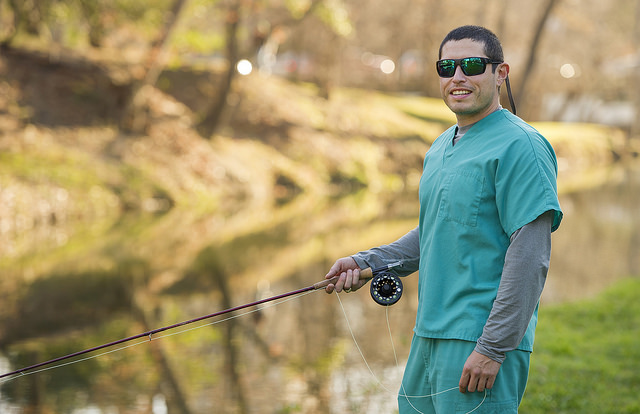A day in their scrubs

Meet second-year dental student Marcus Montalvo
Hometown: San Benito, Texas
Undergrad institution: Texas A&M University — bachelor’s in English — and University of Texas-Pan American, now University of Texas Rio Grande Valley — bachelor’s in biology
Marcus Montalvo has been fishing since before he could walk — literally.
“My brother Michael and I grew up fishing, and my mother would take us in Pampers,” says Montalvo.
As infancy transitioned to childhood, and childhood, adolescence, the brothers became inculcated in the family pastime. The independence of young adulthood gave the two an opportunity to take solo ventures traversing the waters of South Padre Island and the Lower Laguna Madre bay system.
“We’d stay out all night fishing,” says Montalvo. “Initially it started out with us using bait. Then we used artificial lures, where you have to actually coax the fish to bite. Now it’s fly fishing. Ninety-nine percent of the time my brother and I are fly fishing. It’s a different level of difficulty.”
He and his brother — now a fishing guide — have won tournaments back home. The two are even part of a pending documentary with the Nature Report’s Richard Moore airing on Valley Central news, the local CBS affiliate. Trips home include an assumed goal: “When I’m there I try to be out on the water every day,” Montalvo says.
His track to dentistry wasn’t quite as direct.
After receiving his degree in English from Texas A&M in 2007, Montalvo moved to San Antonio, where he worked in the insurance industry before becoming a permanent substitute teacher for the South San Antonio Independent School District.
The door-to-door position selling insurance was taxing, but not without its merits. The then-24-year-old had to pick up on some interpersonal savvy, quizzing corporate leaders and older adults on the status of their financial affairs.
When Montalvo decided to shift his professional focus to the health care arena, his family was quick to support him, just as they had for his entire career. And when dentistry wasn’t initially on his shortlist, it was once again a family member (and dentist) who asked him an unassuming question: Why not dentistry?
“I started doing the research,” Montalvo says, “talking to the dentists that I knew, and I couldn’t ask for anything better.”
Dental school survival strategy: Study. A lot of the D1s ask, “What do I do?” You know what to do; there is no secret. You have to study. No one can just show up for an exam and take it — you have to be prepared.
Favorite energy food: Oreos. We’ll buy a pack, and they’re gone in one sitting. Pizza sometime. I’m not big on sodas, thankfully. Just milk and Oreos. The Wal-Mart by my apartment practically has one aisle completely dedicated to Oreos, and it’s amazing.
Best way to unwind after a long day in lecture, lab or clinic: I fish a lot. If I wasn’t in dental school I would probably be a guide back home. Whatever chance I get, I fish in Dallas, or even the little creeks, like Turtle Creek or White Rock Creek. That’s just because it’s right there. We’ll drive every now and then to Denison to Lake Texoma; I went fishing one time in Oklahoma, to Beavers Bend.
That’s what I miss about back home. That first time out of the valley it was a culture shock being away from the water that I knew so well.
Dental school aha moment: Sitting in some of the lectures, like clinical diagnosis or fixed, and knowing where our professors are going with a question. They ask us because of course these things are going to happen in clinic. It’s about being able to think clinically, even though we haven’t had very much exposure.
Best patient care experience: Several times dentists who have delivered crowns for people, especially anterior crowns, and seeing their patients’ faces light up; it’s night and day from what they looked like. That’s something very special. Not every patient is going to be that way. Those are the patients who are going to keep you coming back. The patients that remind you, you are doing good things for good people.
Goal after graduation: To eventually own my own practice, if not a couple of them. I like the idea of general, just because you can do a really wide range; you are not just focusing on one thing. Now that I’ve done the community service aspect of dentistry, one goal is setting up things to educate the community. Whether it’s a weekend a month, or a weekend a year, just go out to the community and educate all age groups and let them know, when disease happens in your mouth, it’s not just in your mouth. Where I’m from, it’s a medically underserved area across the board. A lot of it is, they just don’t know that.
What people may not know about you: I’m 31. The maturity level, for my part, I couldn’t have done it differently. I don’t think I would have been as determined and as focused when I was 22. I don’t think I could have appreciated it the same.